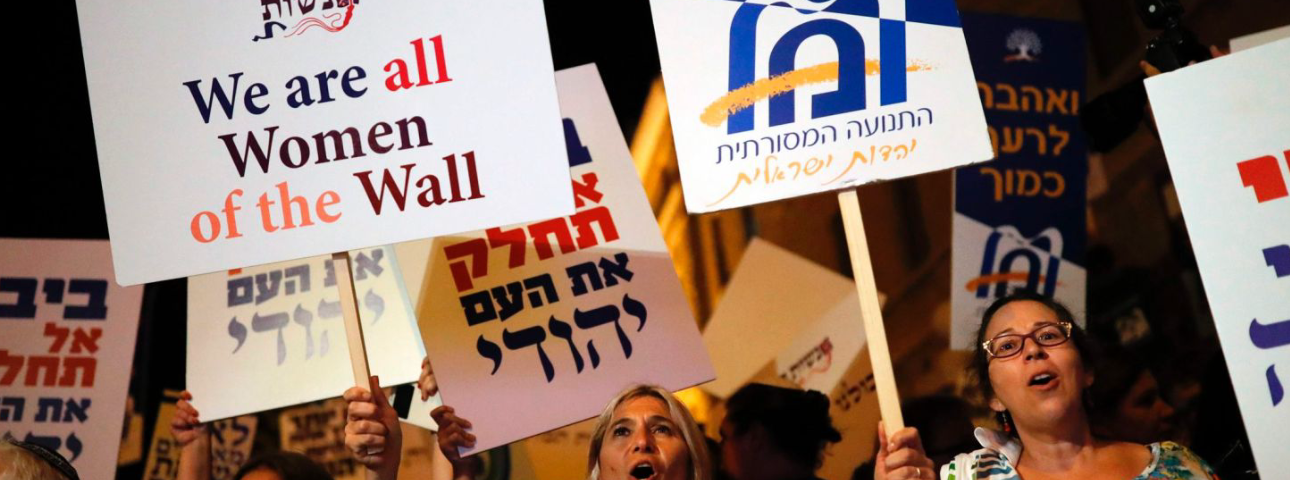United by Outrage? Israel's Arab Citizens and American Jews
Now you know what it's like to feel marginalized and unequal in Israel. Arab citizens know that all too well. That's why we must join forces

Imagine the following scenario: The Reform Movement is in Israel for a convention, and the Muezzin Bill goes up for a binding vote in the Knesset. This legislative proposal aims to prohibit the Muslim call for prayer from being played through loudspeakers at night. Many Israelis claim that such a bill, if passed, would infringe on Muslims' freedom of worship.
Continuing our thought experiment, Prime Minister Benjamin Netanyahu, who declared that he would support the bill, is set for a large dinner at the convention with leaders of the Reform Movement. Yet, in line with their principles of pluralism and equality, the Reform Movement cancels the dinner.
In this parallel universe, the Muezzin Bill becomes a hot topic of conversation in the American Jewish media; rabbis and lay leaders write strongly worded op-eds and speak from their respective pulpits on how such a piece of legislation will serve to distance Jewish diaspora communities from Israel.
Of course, the above storyline has no basis in reality. Today, diaspora-based Jewish organizations speak out mostly on matters affecting their own community. Apart from pockets of liberal support inside Israel, the Arab community is far too often left to its own devices, not just in regard to this particular bill but on other issues as well.
However, upon closer inspection, such a blasé attitude makes little sense. After all, the motivation behind the desire to restrict Muslim worship bears a striking resemblance to the reasoning that attempts to justify the restriction of non-Orthodox prayers at the Western Wall. So, while the ultimate fate of the Muezzin Bill may have little effect on Jewish communities abroad, it will impact the lives of hundreds of thousands of Arabs living here. Most disconcertingly, such legislation will affect the kind of society and democracy that most diaspora Jews wish for Israel.
In addition to the Muezzin Bill, there are other threats to Israeli society that religiously progressive Jews should consider addressing. The situation in the West Bank and Gaza Strip, as well as chronic inequality between Jews and Arabs within Israel, are two examples that come to mind. Communities and individuals dealing with these inequalities usually share a similar characteristic: we feel that we are alone in our struggles.
This is a shame. It is also ineffective. Indeed, Jews in the diaspora, the majority of Jews in Israel and the country's Arab citizens share similar interests and values. We all believe in democracy, pluralism and equality. Yet, we continue to fight the good fight on our own, instead of joining forces. As a result, our ability to affect change is severely hampered.
Many Arabs living in Israel understand the growing frustration being experienced by Jewish communities abroad. We understand because on a daily basis we share these experiences of being marginalized. Still, despite this common denominator, it sometimes feels as if community leaders abroad are concerned only with their own struggle, unaware of the parallel struggle for equality and basic human dignity taking place within Israel.
As such, the recent controversy surrounding the creation of an egalitarian prayer space at the Western Wall should be construed as an opportunity. Yes, we can change things. We can be more constructive. But success will entail a new mindset by different communities abroad, one that embraces the potential of working together across communal and religious lines.
Such a shift in mindset requires that we put our values, not our communities, in the center of our struggle. If viewed this way, any struggle for equality becomes a common struggle; any struggle for pluralism becomes our common struggle; and every struggle to bolster democracy becomes the focus of all of our communities.
In short, our chances of succeeding together are far greater than our chances of succeeding separately.
